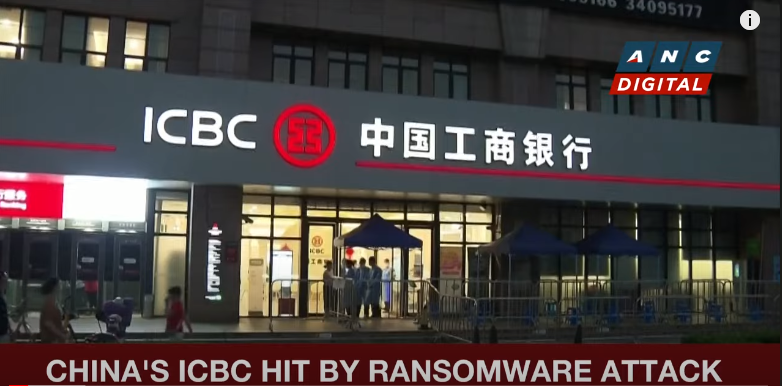In the swift currents of the global financial realm, the recent cyber onslaught on the U.S. financial services sector of the Industrial and Commercial Bank of China (ICBC), the titan of the banking world, has reverberated across the industry. This piece takes a deep dive into the nuances of the attack, its aftermath, and the broader ramifications for Treasury markets.
 |
| China's biggest lender is hit by a ransomware attack. |
Ransomware attack: Prelude to Disorder
Ransomware prevention in banking
ICBC, a juggernaut in the banking domain, revealed on Thursday that its financial services wing bore the brunt of a ransomware attack, resulting in disruptions to critical systems. Despite the onslaught, ICBC successfully navigated through the clearing of U.S. Treasury trades executed on Wednesday and repo financing transactions carried out on Thursday. Swift action was taken to isolate affected systems, containing the incident at its core.
Unveiling Ransomware
The term "ransomware" has woven itself into our digital lexicon, denoting a form of cyber assault where hackers wrest control of systems or information, only relinquishing their hold upon receiving a ransom. This malicious method has gained traction among malicious actors, leading to a surge in such incidents in recent years.
Law enforcement collaboration
ICBC response to cyberattack
As the dust settled, ICBC embarked on a thorough investigation, bolstered by a cadre of information security experts, aiming to expose the culprits behind the attack. The collaboration with law enforcement adds a layer of complexity to the evolving narrative.
U.S. Treasury Trades in Disarray
While ICBC asserts success in clearing Treasury trades, reports from various news outlets, including the Financial Times, paint a different picture. The ransomware attack purportedly impeded the ICBC division from settling Treasury trades for other market participants. In response, the U.S. Treasury Department acknowledged the cybersecurity issue, maintaining ongoing communication with key financial sector participants and federal regulators.
Isolation and Autonomy
Cyber incident containment
ICBC underscores the autonomy of its U.S. financial services arm, affirming that email and business systems operate independently of ICBC's operations in China. Notably, the cyber onslaught spared ICBC's head office, the New York branch, and other affiliated institutions worldwide.
Gazing into the Future
The repercussions of the ICBC cyberattack ripple through the global financial expanse. As we keep a vigilant eye on the situation, pivotal questions emerge about the vulnerabilities of financial institutions, the effectiveness of cybersecurity measures, and the imperative for collaborative efforts to fortify the sector against cyber threats.
In the aftermath of the ICBC cyberattack, the focus shifts to comprehending the key facets surrounding the incident. From the initial onslaught to the aftermath, dissecting the ransomware attack and its impact on U.S. Treasury trades forms the core of our exploration.
Financial sector cybersecurity
What propels cybercriminals to launch ransomware attacks? Unraveling the motives behind such nefarious activities opens a window into the broader landscape of cybersecurity threats, prompting contemplation on the reasons for the surge in the popularity of ransomware attacks.
Recovery strategies for cyber incidents
Amidst the chaos, gaining a perspective on the cybersecurity measures employed by ICBC becomes imperative. The ongoing investigation, collaboration with law enforcement, and the assertion of operational independence shed light on the multifaceted nature of the incident.
F.A.Q.
Question 1.
Q.: What is the significance of the recent cyberattack on ICBC's U.S. financial services division?
A.: The cyberattack on ICBC's U.S. financial services division holds immense significance as it disrupted the trading of Treasurys, causing ripple effects in the global financial landscape.
Question 2.
Q.: How did ICBC respond to the ransomware attack?
A.: Following the ransomware attack, ICBC promptly took action by isolating impacted systems to contain the incident. The bank also successfully cleared U.S. Treasury trades and repo financing trades executed during the attack period.
Question 3.
Q.: What is ransomware, and how does it work?
A.: Ransomware is a type of cyberattack where hackers seize control of systems or information, demanding a ransom for their release. This malicious method has gained popularity among bad actors, leading to a surge in such incidents in recent years.
Question 4.
Q.: Has ICBC identified the perpetrators behind the cyberattack?
A.: ICBC has not disclosed the identity of the attackers but has initiated a thorough investigation. The bank is progressing recovery efforts with the support of its professional team of information security experts and collaborating with law enforcement.
Question 5.
Q.: How were U.S. Treasury trades affected, and what steps are being taken to address the disruption?
A.: Despite ICBC's claim of successfully clearing Treasury trades, reports indicate disruption, preventing the division from settling Treasury trades for other market participants. The U.S. Treasury Department is actively monitoring the situation and staying in regular contact with key financial sector participants and federal regulators.
Comments
Post a Comment